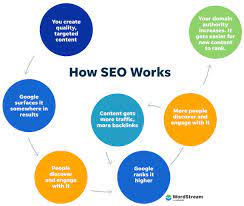Understanding the Definition of SEO in the UK
The Definition of SEO: A Comprehensive Guide
SEO, which stands for Search Engine Optimization, is a fundamental digital marketing strategy aimed at improving a website’s visibility and ranking on search engine results pages (SERPs). In today’s highly competitive online landscape, SEO plays a crucial role in driving organic traffic to websites and attracting potential customers.
Understanding the Basics of SEO
SEO involves a series of techniques and best practices that help search engines like Google understand the content of a website better. By optimising various elements such as keywords, meta tags, and content structure, SEO aims to make a website more relevant and authoritative in the eyes of search engine algorithms.
The Key Components of SEO
There are several key components to effective SEO:
- Keyword Research: Identifying relevant keywords that users are searching for.
- On-Page Optimization: Optimising content, meta tags, and internal links on individual web pages.
- Off-Page Optimization: Building backlinks from reputable websites to improve domain authority.
- Technical SEO: Ensuring proper website structure, mobile-friendliness, and site speed.
- Content Creation: Producing high-quality, valuable content that engages users and attracts natural links.
The Benefits of Implementing SEO
By investing in SEO, businesses can enjoy a wide range of benefits, including:
- Increase in Organic Traffic: Higher rankings on SERPs lead to more organic traffic to your website.
- Better User Experience: Optimised websites provide a seamless user experience that keeps visitors engaged.
- Better Brand Visibility: Improved visibility on search engines helps build brand awareness and credibility.
- Growth in Sales and Conversions: Targeted traffic from SEO leads to higher conversion rates and increased revenue.
In Conclusion
In conclusion, SEO is an essential digital marketing strategy that can have a significant impact on your online presence and business success. By understanding the principles of SEO and implementing best practices, you can position your website for long-term growth and success in the competitive online market.
Understanding SEO: A Guide to Its Importance, Function, and Benefits for Businesses
- What is SEO and why is it important?
- How does SEO work?
- What are the key components of SEO?
- Why is keyword research important in SEO?
- How can businesses benefit from implementing SEO?
- What are the common misconceptions about SEO?
What is SEO and why is it important?
Search Engine Optimization (SEO) is a crucial digital marketing strategy that focuses on improving a website’s visibility and ranking on search engine results pages (SERPs). It involves various techniques such as keyword research, content optimisation, and link building to enhance a website’s relevance and authority in the eyes of search engines like Google. SEO is important because it helps businesses attract organic traffic, increase brand visibility, and drive conversions. By implementing effective SEO practices, businesses can reach their target audience more effectively, establish credibility online, and ultimately achieve long-term success in the competitive digital landscape.
How does SEO work?
SEO, or Search Engine Optimization, works by optimising various elements of a website to improve its visibility and ranking on search engine results pages (SERPs). This involves a strategic approach that includes keyword research, on-page optimization, off-page optimization, technical SEO, and content creation. By aligning these elements with search engine algorithms and user intent, SEO helps search engines better understand the relevance and authority of a website’s content. Ultimately, effective SEO drives organic traffic to a website, enhances user experience, and boosts brand visibility in the highly competitive online landscape.
What are the key components of SEO?
When exploring the question “What are the key components of SEO?” it becomes evident that Search Engine Optimization comprises various essential elements. These components include keyword research to identify relevant search terms, on-page optimization to enhance individual web pages, off-page optimization for building domain authority through backlinks, technical SEO for ensuring website structure and performance, and content creation for engaging and valuable information. Each of these key components plays a vital role in improving a website’s visibility and ranking on search engine results pages, ultimately contributing to a successful SEO strategy.
Why is keyword research important in SEO?
Keyword research is a critical aspect of SEO due to its pivotal role in understanding the language and search intent of users. By identifying relevant keywords that align with what users are searching for, businesses can tailor their content and website optimisation strategies to attract targeted organic traffic. Effective keyword research not only helps improve a website’s visibility on search engine results pages but also enhances user experience by providing valuable and relevant information. Ultimately, investing time and effort in keyword research empowers businesses to create content that resonates with their target audience, driving higher engagement, conversions, and overall success in the competitive digital landscape.
How can businesses benefit from implementing SEO?
Businesses can benefit significantly from implementing SEO as it helps improve their online visibility and attract targeted organic traffic to their websites. By optimising their web content, keywords, and technical aspects, businesses can achieve higher rankings on search engine results pages (SERPs), leading to increased brand visibility and credibility. Additionally, SEO enhances user experience by providing relevant and valuable content, ultimately driving more qualified leads and conversions. Overall, investing in SEO can result in long-term growth, improved online presence, and higher revenue for businesses in today’s competitive digital landscape.
What are the common misconceptions about SEO?
There are several common misconceptions about SEO that often lead to confusion among website owners and digital marketers. One prevalent misconception is that SEO is a one-time task rather than an ongoing process. In reality, SEO requires continuous monitoring, adjustments, and updates to stay effective in the ever-evolving digital landscape. Another misconception is that stuffing keywords into content will automatically boost rankings, when in fact, keyword stuffing can harm a website’s SEO performance. Understanding and dispelling these misconceptions is crucial for implementing a successful SEO strategy that yields sustainable results and improves online visibility.
